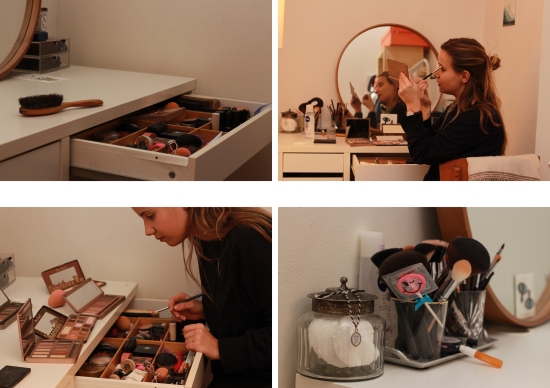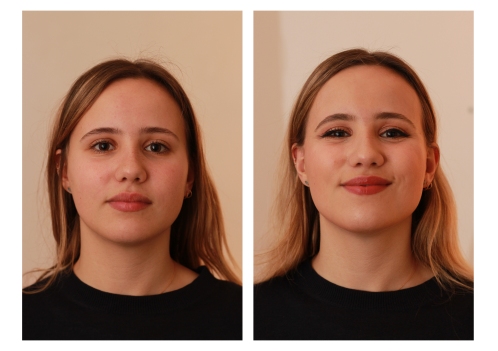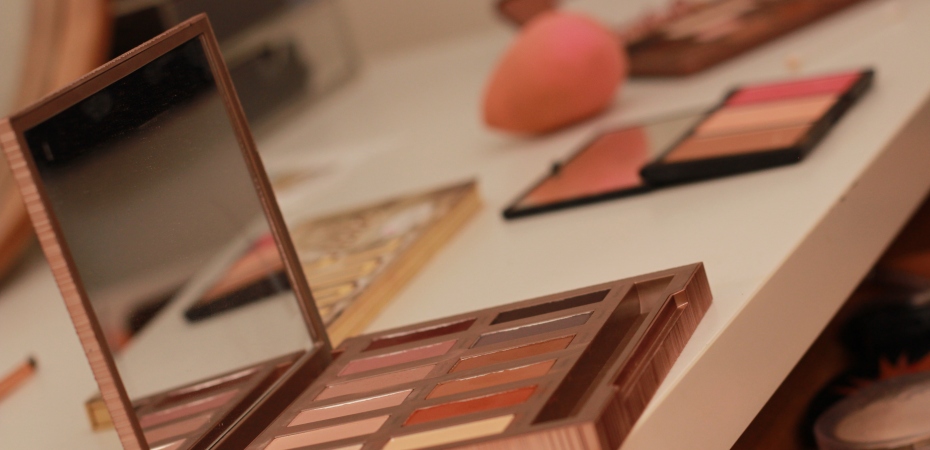Did you know that I have studied political science for 3 years? Well, I did. But no worries, I haven’t turned makeup into a politicised debate. I treated it more like a sociological matter.
I have always been fascinated by makeup and beauty in general. I wanted to understand this paradox of women not wearing makeup at home but claiming using makeup for themselves rather than for other people. I wanted to understand what place makeup has in our societies and what role it has in women’s lives.

Is it a social constraint? Or is it the total opposite: a way for women to emancipate and express themselves? To what extent does the social history of feminine beauty still have an influence on our practices?

I have interrogated 8 young women throughout 2-hour-long interviews, taken pictures of their products, them, their routines and tried to understand their position towards makeup. And trust me, all of them did have a position! Rather clear. I also gathered a few hundreds of answers to my online surveys.
I find it fascinating that we are now facing such contradictory social moves: the explosion of makeup as an art, a passion, a job, with a lot of colours, new techniques made available to everyone, and on the other side, the celebration of natural beauty, the #nomakeup movement, etc.
Even in feminism: there is such a huge paradox between the different branches. Those who consider makeup as a full right that noone should judge, and those who consider makeup as a net that traps women within the social norms. Of course, there are also many currents that simply consider that each and every one does whatever the heck they want! But the fact that there are so many possible sides to take clearly shows the problem that surrounds this matter, and the confusion it generates.
To help you see clearer, here are some of the most interesting points of my analysis:
- Overall, makeup seems to be a tool to help women define their identity and it improves their self-confidence:
- Many women consider makeup as a way to express their feminine identity.
- A lot of them also use makeup to help them enhance their own personality and give a faithful image of themselves to people around.
- Traditional tribes and enclosed social groups (gothic groups for example) use makeup to define their group identity and make a claim that they belong to this group.
- Makeup can also be used in the case of sickness or disability. More associations and stores develop special sessions for women to help them make peace with their appearance and rebuild an identity of their own.

- The growth of makeup industry comes from the growing individualism of our societies:
- It became a huge deal because individuals realised that it helped them control their image, which helps get a higher social status. Image control is a great symptom of the 2000’s: we want to have a perfect control of our social image, and that’s why we use social media so much! It allows us to control how people see us.
- More importance is given to people as subjects, rather than objects: make an effort on your appearance is a proof of your investment and personal work, which is positively seen. You are not a fade object but a real actor of your life because you take control of what you look like.
- The fact that people care more and more about themselves creates a big paradox: they are full owners of their own bodies, but at the same time, it creates a great responsibility towards themselves that may evolve into social pressure.

- Some historical practices of makeup that still influence our customs:
- The Renaissance really established beauty norms about what is “good” and what shouldn’t be done. For example, the fact that women don’t wear makeup at home but outside may come from the fact that men used to consider makeup as a disguisement, a sign of dishonesty. They considered that their wives had to be “honest” inside their house, by not wearing any makeup. If you are interested in this theme, I could make a full article of habits that we all have that may surprisingly take roots in the Renaissance.
- The 17th century and onwards kept on putting the individual on a pedestal and followed women emancipation. For example, Bourjois was one of the first brands to offer a “purse makeup kit”, for women to be able to take their makeup out and enjoy their social life outside the house.

- New technologies also played a great role in the establishment of beauty norms and placing makeup at a central position in women’s lives:
- Photography and cinema created beauty icons that encouraged the use of artificial enhancement.
- The development of visual advertising largely reinforced beauty norms and marketing techniques participated in creating the makeup “duty”.

- These last years, however, there is an opposition move:
- More and more women stop using makeup, and a lot of them even take it as a stance against makeup “domination”. Many said that they felt women were pressured into wearing makeup and looking pretty and by refusing to wear makeup, they reject this dogma.
- Alicia Keys and other beauty icons participated in this movement and took it further to make it a buzz: you heard about the #nomakeup movement, right? This globalisation of the trend made it a real social cause for which many women fight. You can read Alicia’s inspiring letter about it here.

- A reinterpretation of beauty and adaptation of cosmetics?
- You have probably noticed how Korean products were widely emerging in occidental stores and social media in general. Asian conception of beauty (pure, natural) is becoming the new norm, and that comes along with the emergence of the “nude” mania as well. More and more cosmetic brands start offering products that actually treat rather than camouflage (CC cream formula for instance), and the newest makeup trends tend towards a makeup that looks like no makeup and enhances natural traits rather than covering them.
- Also, brands surf on this wave to launch marketing campaigns that support natural beauty and self-acceptation, to participate in lowering the exigence level that women put on themselves and use this developing need as a market niche. Have you heard of Dove campaign for women wellness? If not, you can check out the video of one of their projects here.
I really enjoyed investigating this topic, and I was amazed to see how much those women opened up to me and told me all about their little worries, lack of confidence, complexes, or more happily their self-love and passion for makeup. I was always surprised to hear about who couldn’t go outside without makeup and who didn’t mind. For example, one of them who loves to wear a lot of makeup doesn’t mind going outside without makeup, and on the other hand, one that only uses mascara could never go outside without.
I remember how much enthusiasm I got from everyone that participated in the online surveys. They all wanted to read the final thesis! So I thought I may be worth sharing my findings here.
Let me know what you thought about it! Also, if you’re interested in reading the full thesis, send me a message, I would gladly send it to you.
How do you feel about makeup? Do you feel comfortable going outside without?

This has always been one of those things I’ve wondered about, so happy to see someone writing about it on their blog and for their thesis no less! I feel perfectly comfortable going out without makeup on but I can’t deny that wearing a little just gives me that extra spring in my step xx
LikeLiked by 1 person
Thank you for your comment! A little makeup always feels good to wear x
LikeLiked by 1 person
This was so creative! I love how you picked something you were really interested in. I go through phases where I’m super interested in makeup and then I just don’t even feel like being bothered with it!
LikeLiked by 1 person
Yes, it’s kinda the same for me! I mean I always love makeup but I have periods during which I love to use it everyday and others during which I go bare face for days! I think it’s great to be comfortable with both 🙂 Thanks for your lovely comment x
LikeLiked by 1 person
Congratulations on your thesis! Definitely a great achievement (I finished mine last year). I wear makeup on almost a daily basis, but I’m still comfortable going out with a bare face! I definitely encourage everyone to be confident in themselves, makeup or not!
LikeLiked by 1 person
Thank you so much and congrats on yours too 😀 I loved writing mine. I totally agree with you, self-confidence is so important! Thanks for your sweet comment! x
LikeLike
This was such an impressive read. I would honestly be very interested in reading your thesis! As for me, I haven’t worn makeup for years. Sometimes, maybe for a special occasion, I will put some on, usually very lightly (maybe something for the lips), but otherwise, I stay away from foundations or anything “heavy”. To be honest, I think I look strange, not myself, with makeup on, and it’s also extremely uncomfortable! I am also afraid of what it will do to my skin.
LikeLiked by 1 person
I totally understand your views! I think it’s like many things, if you are not used to it, it can really feel weird on you. If you would like to read my thesis, you can drop me an email at arainydayincph@gmail.com and I’ll send it to you! Thank you so much for your comment and interest! x
LikeLiked by 1 person
I am not really a make up kind of girl. I only use eyeliner and mascara. That was a great post. Have followed you to know more about make up. ☺ ♥
LikeLiked by 1 person
Thank you very much! That is so sweet x
LikeLiked by 1 person
wow.. this is so interesting! 🙂 in fact, i’m sure it is easier when you actually do some research about something that you’re passionate about. cheers from yet another (failed) political scientist-ish! 😀
LikeLiked by 1 person
Yes, I got lucky to find a tutor willing to accept my topic choice! I would have been so sad to have to write about something boring! I’m glad to see I’m not the only one who hated political science! Do you have an article about it? I’d love to read your experience 😁
LikeLike
Wow, this was so interesting! I’m actually finding that the older I get, the more comfortable I feel going without makeup. Its better for my skin too! Loved this, followed you so I can read more! 🙂
LikeLiked by 1 person
Yes, I think we all go through some complicated moments around our puberty and then our self-confidence gets stronger, and we care more about being healthy! Thank you so much for your comment and enthousiam 😁
LikeLike